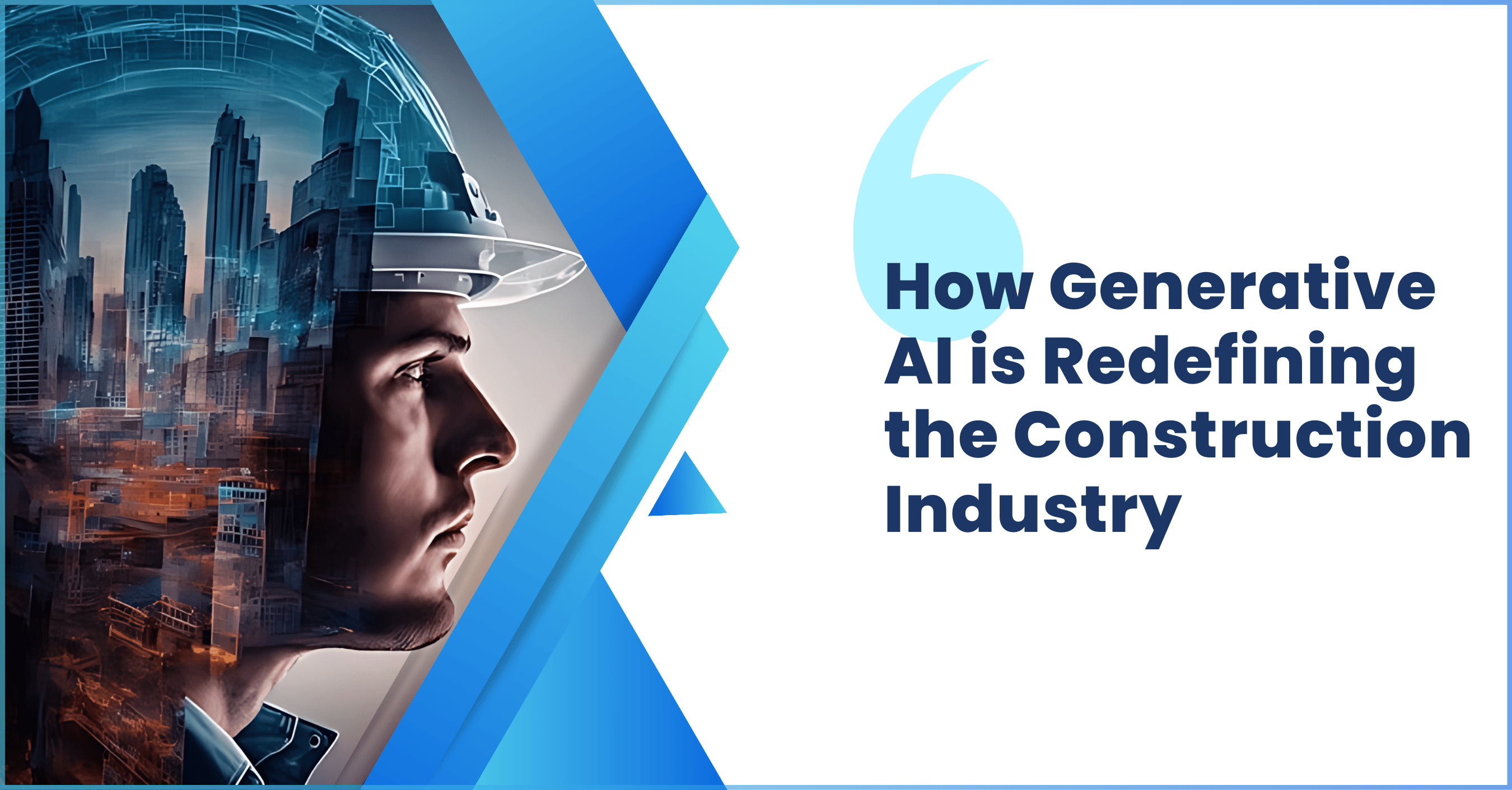Thought Leader – Nayan Yajnik, CTO
Generative AI has emerged as a transformative force across industries, with its global market value estimated at $44 billion. Remarkably, 92% of Fortune 500 companies have already adopted this technology, signaling that AI’s impact is no longer confined to tech companies. Its disruptive potential is reshaping diverse sectors—from Manufacturing, healthcare, finance, retail, construction, and more.
The construction industry, despite being one of the largest globally, has seen slower digital transformation being a labor and material sector. However, the introduction of Generative AI is reshaping the landscape, driving significant gains in productivity and cost-efficiency. With its wide range of applications, generative AI is offering innovative solutions to many of the industry’s complex challenges, unlocking new opportunities for growth and optimization.
The Need for GenAI
Generative AI, or GenAI, represents a leap forward in artificial intelligence, mimicking human creativity by generating and refining data and code. Unlike traditional AI systems that rely on predefined rules, Gen AI functions through unique models capable of producing new information. It learns from large datasets and utilizes advanced algorithms to generate realistic data.
Some of the most prominent examples of GenAI include ChatGPT, Gemini, DALL-E, and the Retrieval-Augmented Generation (RAG) framework. These tools especially RAG are profoundly used in the advancement of the AEC industry due to their problem-solving capability.
Learn More – Exploring the Potential of Generative AI
Generative AI For AEC- Architecture, Engineering, and Construction
Generative AI is one of many AI tools that is shaping the digital growth AEC- Architecture, Engineering, and Construction industry. However, what sets Generative AI apart is its ability to leverage large language models (LLMs) to generate new text, designs, and images, making it an invaluable tool for tasks such as designing and planning construction projects.
Let’s explore some of the best use cases of Generative AI in construction below:
Key GenAI Use Cases in the AEC Industry
Better Designing and Planning
Building Information Modelling (BIM) is a 3D model-based process widely used by construction professionals to efficiently plan, design, and manage buildings and infrastructure. It provides a comprehensive approach to creating, visualizing, and managing projects, enhancing collaboration and decision-making throughout the construction lifecycle.
By leveraging GenAI-powered design tools, engineers can produce multiple construction designs that enhance efficiency and reduce rework. These tools also enable users to explore various design alternatives based on project requirements.
Construction Site Safety Monitoring
The rate of fatal accidents among construction workers is reportedly five times higher than in other sectors, with common incidents involving falls and slips. However, the implementation of AI technology can help prevent these hazards. AI-powered analytics tools can monitor job sites, automatically detecting and prioritizing risks, such as unsafe scaffolding, waterlogging, and personnel-related hazards.
These AI tools can predict and flag potential safety issues, enabling project leaders to focus on core tasks without spending excessive time on-site monitoring. AI algorithms can also prioritize safety concerns, such as missing safety equipment (e.g., gloves, helmets), and notify contractors to address risks based on a ranked system. This ensures that safety issues are managed proactively.
Cost Calculation
Accurate cost estimation is essential for the success of any construction project. Generative AI simplifies this process by using historical data and project-specific information to deliver precise cost predictions. By automating the estimating process, AI-powered tools help contractors avoid underestimating costs, which can lead to delays and budget overruns. With AI, construction companies can generate faster, more accurate estimates, ensuring financial transparency and reducing the risk of cost discrepancies. This enables contractors to submit competitive, well-rounded bids while optimizing time and resources.
Material Choice
In construction, selecting the right materials is critical for ensuring both quality and sustainability. Generative AI enhances this process by evaluating material properties and environmental impact, offering optimized material choices that balance performance, cost-effectiveness, and sustainability. This helps companies make informed, eco-conscious decisions that satisfy client needs.
Additionally, AI is crucial in improving inventory management and material tracking on large construction sites. It streamlines the process by efficiently managing a vast array of materials and equipment, reducing mismanagement, delays, and cost overruns.
Learn More – Use Cases for RPA plus Chatbots Implementation: 10+ Industries Are Benefiting
Documentation and Reporting
Generative AI simplifies documentation for construction by automating tasks such as report generation, progress updates, and compliance paperwork. By digitizing physical documents like blueprints and construction plans using image or camera data, AI quickly converts them into digital formats. It recognizes symbols, text, and other elements through machine learning algorithms, reducing manual errors and making document modifications easier. This automation streamlines reporting ensures accuracy, and minimizes time-consuming administrative tasks, allowing project teams to focus on core activities while cutting costs and improving overall project efficiency.
Leverage GenAI for Exceptional Customer Experiences
Generative AI is gaining global attention due to its problem-solving capabilities, creativity, and productivity enhancements. Organizations across various sectors are adopting Generative AI to improve at least one aspect of their business, significantly boosting annual growth. Below are some common benefits of implementing Generative AI in business:
Expand the Horizon of Human Creativity – Generative AI allows creators to surpass the limits of imagination and overcome creative blocks, generating fresh ideas, designs, and prototypes. It is a powerful tool in marketing, design, and product development.
Produce Quality Data – Generative AI can efficiently produce large datasets with diverse content types. This includes generating content in multiple languages, offering data across various parameters, and providing actionable insights and analytics.
Accelerate Processes – Numerous Generative AI coding tools assist developers in writing new code or correcting errors. This is especially valuable during the early stages of the development cycle, accelerating the process.
Enhance Customer Experience – Businesses utilize Generative AI to create user-friendly, customized content with real-time insights. This boosts user engagement, enhances customer satisfaction, and builds trust.
Expedite Adaptation – A key strength of Generative AI is its learning ability. It evolves with user input, helping businesses tackle challenges more effectively and adapt swiftly to changing needs.
Enhance GenAI for Construction
Generative AI is key to the future of the AEC -Architecture, Engineering, and Construction industry, with immense potential to enhance productivity and efficiency. While challenges remain, the strategic integration of GenAI can unlock new opportunities, streamline operations, and deliver unparalleled long-term value.


